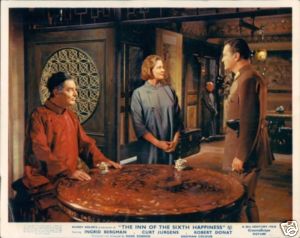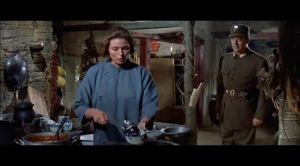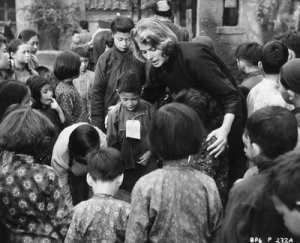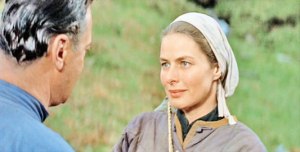The Inn Of The Sixth Happiness (1958)
The second highest grossing film in the year it was released, this is an especially frustrating piece of dodgy big budget yellowface mush in that there’s an extraordinary story in there somewhere but it’s buried under all sorts of hokey sentiment, feel-good schamltz and truly disastrous casting.
Based on the true story Gladys Aylward, who worked as a missionary in China most of her adult life, this two and half hour epic tells the tale of Gladys’s early work in China and particularly her leading of 100 orphans across difficult terrain to safety from the invading Japanese army. In between all this (and dominating the screen time to an inordinate degree) is Gladys’s (by all accounts) almost completely fictionalised romance with Colonel Li Nan, here presented as a Eurasian but played by the entirely Caucasian German Curt Jurgens.
There’s no doubting that Gladys Aylward was a remarkable woman and she herself loathed this film. Among a whole list of inaccuracies she was mortified to see herself (in real life short, dark and cockney) portrayed on screen by the statuesque, blonde, camera-genic and Scando-posh Ingrid Bergmann.
She was also particularly upset by the way her passage to China was glossed over in the film as a convenient recommendation letter from a kindly employer and a few comedically rude Russian soldiers before “Hollywood’s train delivered her neatly to Tsientsin.” In reality Aylward and her family had to struggle particularly hard to get her to the Middle Kingdom (in a real indictment of class-ridden society she was turned down as a missionary because her academic qualifications weren’t deemed strong enough) and she had to spend her life savings on a perilous and complicated train journey where at one point she was forced to abandon the train in Siberia in what must have been a terrifying ordeal for a young woman on her own. Along with this the name of her missionary in Yang Cheng was “Eighth Happiness” (owing to the traditional “lucky” factor the Chinese associate with the number eight) and she felt her reputation was damaged by the numerous movie-snogging sessions Bergmann and Jurgens share in the film. In real life Gladys Aylward went to her grave never having kissed a man and the ending, where she leaves her orphans in Xian to return to Colonel Li Nan, is pure fiction. She continued working with orphans until she was in her sixties and never saw Li again. She also felt that Li being portrayed as Eurasian was an “insult” to his Chinese lineage. I wonder if she would’ve felt the same way had Li been portrayed by a genuine Eurasian. I do hope not.
The film itself is actually reasonable engrossing for the first half an hour until Hollywood Gladys arrives in China (in reality Snowdonia) and we glimpse our first sight of Robert Donat as The Mandarin (no not the Iron Man one), a casting decision so ridiculous it beggars belief as well as shattering all credibility.
From here on in it just gets worse and worse with the final 45 minutes, all tears and melodramatic declarations of love, drags the actors into unfortunate over-playing and there’s one extraordinary scene where Ingrid fluffs her lines no less than three times.
In the beginning the Chinese (with the exception of Peter Chong’s jolly cook) are portrayed as scary savages but as the film progresses they morph into picturesque peasants . Of the genuine East Asians the aforementioned Chong (usually second-fiddle in his numerous film appearances) is an amiable enough presence but his characterisation is forced into far too many “ching-chong simpleton” tropes and while there’s a nice role for the young Burt Kwouk as a reformed prisoner Tsai Chin is completely wasted.
The main problem, in my very humble opinion, with this type of film (or stage play) is that it wants its cake but it’s not even sure how to eat it. In truth there’s nothing much wrong with wanting to put some “exotica” on the screen (or stage) but when you have a story set in China and then reduce it to endless scenes of two Northern Europeans supposedly portraying an inter-racial romance but in reality drearily flirting against a North Wales backdrop it rather banjaxes the intention.
 Chopstick lessons with Bergman & Jugens
Chopstick lessons with Bergman & Jugens
Yellowface watch
 Chinese, Caucasian & Eurasian-which is which?
Chinese, Caucasian & Eurasian-which is which?
First up there’s Robert Donat who with even his first non-speaking appearance sat in a sedan chair derails the whole film. Donat sadly passed away just before the film was released and one would hope this wasn’t his last acting role as it makes a very poor epitaph frankly. Despite Tolstoyish facial hair his fruity English tones and mannerisms are more Vicar Of Dibley than Mandarin of Yang Cheng and coupled to this the film requires him to go from concubine-laden public-beheading local despot to tearful goodbyes to a Christian missionary woman, a character-transformation tricky enough in the best of circumstances but one a man in yellowface will surely struggle with.
Less embarrassing but possibly more confusing is Curt Jurgens as Bergmann’s love interest, beefcake hapa hunk Colonel Li Nan. His military uniform is so ubiquitous in appearance that in early scenes he looks and sounds more like Rommel Of The Desert than a Chinese Nationalist Army officer. Watching him talk of his “white blood” is extremely strange and it’s once again heavily indicative of Hollywood’s almost pathological aversion towards featuring strong East Asian male actors in roles that aren’t subservient or asexual, an aversion certainly shared in Britain.
My fave scene? All of the early ones before Ingrid’s character learns to speak fluent Chinese and Donat is dubbed into what I can only describe as florid Emperor’s mandarin. Utterly surreal.
Next we tackle a real Beast Of Yellowface, John Wayne’s ill-fated turn as Ghengis Khan in the The Conqueror. Not to be missed. And neither is The Fu Manchu Complex.





















Whilst understanding your review is written with a focus on wishing to challenge racial stereotypes, it’s not the most balanced. Nor is it, in all cases, entirely accurate. Perhaps you might like to read my own review at the Robert Donat website which will tell you a little more about RD’s part in the film (especially since you seem to have lifted some of my screencaps!). Here’s the link: http://robert-donat.com/2011/12/04/the-inn-of-the-sixth-happiness-2/
Gill. Sorry it’s taken a couple of days to get back to you. I’m not sure what you mean by “not the most balanced”. It’s my opinion. Incidentally I did have a quick glance at your fascinating looking website and virtually the first thing you do is own up to a lack of objectivity! Robert Donat rightly enjoyed a long and illustrious career and is fondly remembered and appreciated (again rightly) but I’m afraid his turn in Sixth Happiness is, IMHO, a shocker. When you talk of “accuracy” again I’m not sure what you’re referring to. I make a point of saying that the “facts” are what I’ve ascertained. I’ve no idea if they’re accurate or not. As for the screengrabs, I wasn’t aware of “ownership”, I just did a googe image search. But then I am an Oriental Villain.
Ha ha! Yes, and you are quite right, I am ridiculously biased. I suppose, in all seriousness, I wanted to point out that Inn was RD’s final film, made whilst he was dying from an undiagnosed brain tumor. He was unable to recall his lines and had to have prompt boards, yet turned up every day, professional to the last. He died just two weeks after completing filming on his role. He took this part after not working for several years due to serious ill health. His final lines in this film, where he says goodbye to Ingrid Bergman’s character, are his goodbye to his acting career. He knew it and so did Bergman, whose distraught tears were genuine. Knowledge of that extra dimension does colour my appreciation of his work on this film.
I utterly agree that, were Inn to be re-made today, the casting would not involve European actors in ‘yellowface’, but it was not unacceptable then. Incidentally, many of the extras in the film were from the Chinese community in Liverpool. There are written accounts of their involvement, if you are interested.
As for the screencaps, you are welcome, but I did want to say that one of the caps was made showing RD glancing over at his prompt board during his final scene.
All good wishes
Yes, I did put in the review that I hoped it wasn’t his last ever performance as he deserved better. Trouble is actors often don’t have much of a choice. I agree with you the farewell scene with Bergman was one of the more genuine moments in the film and had they been cast more “appropriately” it would’ve been a nice scene. There’s nothing wrong with Robert’s “acting” at all it’s the character he’s given that’s problematic. Yes, I was aware that the extras were from Liverpool. Where are the written accounts?
Thank you. I shall find some links for you.
Here are some links …
http://news.bbc.co.uk/1/hi/wales/north_west/3657343.stm
http://news.google.com/newspapers?nid=1499&dat=19590111&id=o_ApAAAAIBAJ&sjid=pCUEAAAAIBAJ&pg=3669,878208
I have seen some more information associated with this project: http://www.soundagents.blogspot.co.uk/2014/06/opera-for-chinatown-installation.html but can’t locate it. If I can dig it out I’ll send it on.
Thank you so much!
I read your dialogue with Gill with much interest. I was in the film as a 6 year old and played Bao Bao and had a few lines, probably dubbed as I had a London accent and not an American one. Of course there are howling inaccuracies in it, it was a Hollywood film pitched at the box office hence the Hollywood stars and expertise in the production ie Malcolm Arnold and Freddie Young. Being in films was a way for the oriental community to earn some extra money and it was quite a social occasion but we weren’t going to overcome typecasting. We were always going to be cute children and sinister rioting and/or fleeing adults. I did ‘pursue’ an acting career for a few years but the roles never changed. When I was 17 I was in a soap and played a Chinese hippie and had an inter-racial kiss. But by then I had had enough. I did go to the a reunion in 2004? and met Burt Kwouk again and ironically the BBC One Show recently contacted me for an interview
Ye Min, this is fascinating and I’m thrilled you’ve written this. I worked with the sadly depart Burt quite a few times. I know just what you mean about it being a “social occasion”. I’m going to email you, if I may, as I’d love to interview you for a film/theatre project I may try and create.
yes that’s fine. my mother was my chaperone during filming of Inn of the sixth happiness and I will be visiting her next week in London. As a family we were in Windoms Way but only I continued with the usual bit parts in Satan never sleeps all with Burt Kwouk and TV dramas and comedy. I now wprk as a dramatherapist so all that must have had a bearing on it.
bets wishes ye